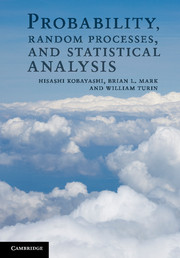 Probability, Random Processes, and Statistical Analysis
Probability, Random Processes, and Statistical Analysis Book contents
- Frontmatter
- Contents
- List of abbreviations and acronyms
- Preface
- Acknowledgments
- 1 Introduction
- Part I Probability, random variables, and statistics
- Part II Transform methods, bounds, and limits
- Part III Random processes
- Part IV Statistical inference
- Part V Applications and advanced topics
- References
- Index
1 - Introduction
Published online by Cambridge University Press: 05 June 2012
- Frontmatter
- Contents
- List of abbreviations and acronyms
- Preface
- Acknowledgments
- 1 Introduction
- Part I Probability, random variables, and statistics
- Part II Transform methods, bounds, and limits
- Part III Random processes
- Part IV Statistical inference
- Part V Applications and advanced topics
- References
- Index
Summary
Why study probability, random processes, and statistical analysis?
Many problems we face in daily life involve some degree of uncertainty and we need to use probabilistic reasoning in order to make a sound decision, be it an investment, medical, or social problem. In many cases “probability” may represent our personal judgment about how likely a particular event (e.g., price movement of a stock we own; positive or negative effect of some medicine we may choose to take when we are ill) is to occur. Probability attached to a given event is generally not based on any precise computation but is often a reasonable assessment based on our knowledge or experience. Such probability may be aptly called subjective or qualitative probability, and may not be scientifically estimated, unless the same event happens repeatedly.
The other type of probability we deal with is what we may call objective or quantitative probability, which can be estimated objectively based on empirical evidence from observable events. This philosophical question concerning subjective versus objective probability has been pondered by many probabilists and statisticians, as we will briefly discuss in Section 1.2. Philosophical discussion on subjective probability still continues today as a fascinating topic, as is found in arguments between two schools of statistics, i.e., frequentist statistics and Bayesian statistics, which will be discussed at the end of this chapter.
In this book we will discuss probability based on the modern probability theory established by Kolmogorov in the early twentieth century.
- Type
- Chapter
- Information
- Probability, Random Processes, and Statistical AnalysisApplications to Communications, Signal Processing, Queueing Theory and Mathematical Finance, pp. 1 - 14Publisher: Cambridge University PressPrint publication year: 2011


